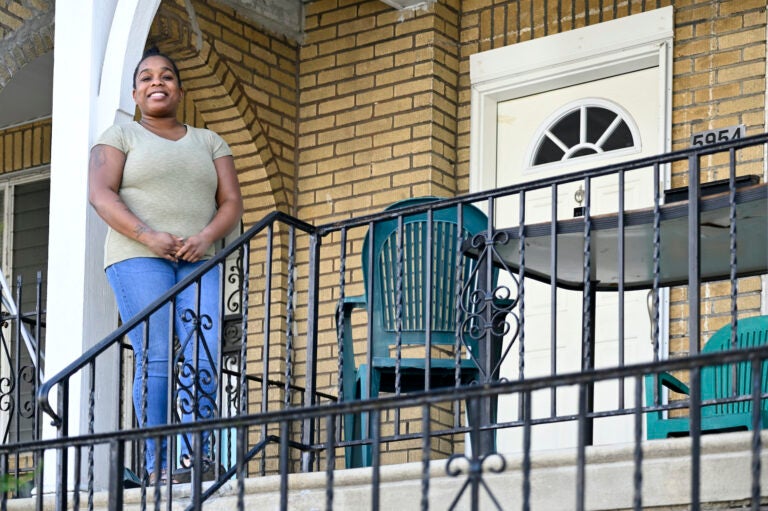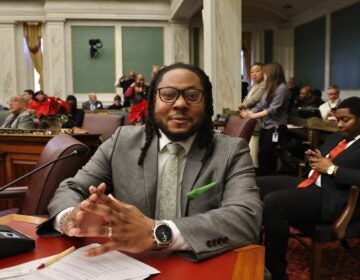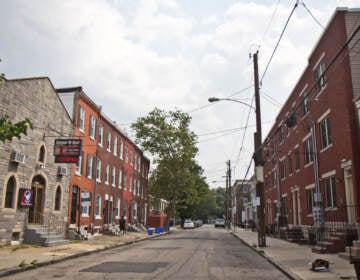Pandemic could lead to foreclosure surge but in Philly, help is just a call away
As job losses soar, Philadelphia homeowners risk foreclosure, but the city’s free housing assistance hotline can help them get mortgage relief.

Evelyn Coates stands on the porch of her home in West Oak Lane on Tuesday, April 14, 2020. (Bastiaan Slabbers for WHYY)
Crystal Major has plenty to be stressed about.
She’s a single mom with a 10-year-old and an 18-year-old at home. She works as a certified nursing assistant, and she’s still reporting to her job at a nursing home despite the threat of coronavirus infection. Her patients need her and she doesn’t have the luxury of staying home.
“It’s really scary right now,” Major said of her work. “They just had a case in my building, on the third floor.”
Until recently she had another major worry as well: that she and her kids wouldn’t have a place to live. In October, she was stunned to learn that her family’s home in North Philadelphia’s Logan neighborhood had been sold at a sheriff’s sale. Due to a mix-up at the bank after the death of her mother, who held the mortgage, the house had been foreclosed on without Major ever being notified.
“I was devastated,” she said. “I didn’t know which way to go, or if I was going to be homeless.”
Major was eventually able to reverse the sale with help from a free legal aid service and is now waiting for the final paperwork to come through. She found help through the city’s housing assistance hotline, which is available to anyone who is worried they may face foreclosure.
That includes the thousands of city homeowners who have lost their jobs recently or seen their hours reduced due to the coronavirus pandemic. Job losses have soared in the last month, with more than 1.3 million new unemployment claims filed statewide since March 15.
Across southeastern Pennsylvania, large employers have temporarily laid off several thousand workers, according to notices filed with the state Department of Labor and Industry.
“We’re seeing layoffs start, and we know that folks out there are scared and don’t know how they’re going to make their next mortgage payment,” said Major’s attorney Joanne Werdel.
Werdel works at Philadelphia Legal Assistance, a nonprofit that runs the housing hotline and provides free civil legal services to low-income city residents.
“Folks are probably freaking out right now, wondering what they’re going to do,” Werdel said.
Werdel noted that most foreclosure activity is frozen at the moment. The Pennsylvania Supreme Court halted foreclosures through at least April 30, and the Federal Housing Financing Agency last month ordered a 60-day suspension of foreclosures for mortgages backed by the government-sponsored corporations Fannie Mae and Freddie Mac, which represents most of the mortgage market. Locally, a sheriff’s sale scheduled for April 7 was postponed until June 2.
But the automatic freezes will end eventually and the resumption of foreclosures has the potential to hit Philadelphia particularly hard. While the number of families who own their houses has steadily declined over the last 30 years, the city still has a strong culture of homeownership, including among low-income families who are more vulnerable in economic downturns.
Philadelphia has long had one of the highest rates in the nation of low-income families owning their homes. More than 31% of city homeowners have annual household incomes below $35,000, according to 2018 Census data.
Evelyn Coates of West Oak Lane fell behind on her mortgage in January after the birth of her son left her struggling to cover child care costs for both him and her 9-year-old daughter. A community organization offered her a grant to cover the shortfall, but her mortgage company failed to provide her with a form needed to get the money released, she said.
In mid-March, a representative of the lender told her she was in foreclosure.
“I was like, ‘Hey, I’ve been calling you guys for these papers, and no one has sent these papers!’” Coates said. “I was livid. I was really upset, especially since I was trying to avoid that process. I’m not in a position to lose my house.”
A few days later, the COVID-19 pandemic shuttered her office and she was laid off from her job as a dental assistant. This month, she finally got hold of a manager at the mortgage company, who offered to suspend the foreclosure and give her three months of forbearance because she lost her job, she said.
Coates still needs to make up a few months of missed mortgage payments, but she’ll be able to do that with savings and grant money once the forbearance is finalized, she said. She expects to receive unemployment payments and eventually get her job back once the office reopens, so she’s not too distressed about her situation.
“I’m the type of person that makes the best of everything, because I’m a single mother,” Coates said. “If I’m stressing, that stress can go on to your kids.”
It isn’t clear yet how many Philadelphia residents will need mortgage relief in the coming months. Werdel said the city hit a peak of more than 8,500 mortgage foreclosures a year at the height of the 2008-2009 economic recession and more recently, has hovered at 3,500 to 4,000 a year. Another 3,000 to 4,000 foreclosures stem from non-payment of property taxes.
As foreclosures surged during the last recession, the city courts created a diversion program that requires mortgage servicers to meet with beleaguered homeowners with the aim of working out ways families can keep their homes. Typically, that involves a loan modification to reduce the monthly payment, often by extending the term of the loan. The process resembles mortgage refinancing.
Homeowners can enter the diversion program by calling the Save Your Home Philly hotline at 215-334-HOME. The hotline staff refer callers to housing counselors, and if needed, those who meet income eligibility requirements can be referred to free legal representation. But Werdel said any owner of their own home who is worried about being able to make their mortgage payment should call the hotline, regardless of their income level.
“For folks who are still employed but just afraid, and they want to talk about what options there might be, they’re welcome to call,” Werdel said. “For folks who have lost a job and want to know — ‘What do I do next?’ — they should call and we can help them walk through what their options are and what steps they can take.”
Several banks including PNC, Citizens, and WSFS have joined state Attorney General Josh Shapiro’s PA CARES initiative, which includes a 60-day moratorium on foreclosures and a grace period for mortgage payments of at least 90 days. Under the federal CARES Act passed last month, banks must offer homeowners with government-backed mortgages up to 12 months of forbearance during which they don’t have to make mortgage payments. Many lenders are also offering forbearance to people whose mortgages are not federally owned or backed.
The moratoriums are automatic but homeowners must request forbearance from their mortgage servicer. Werdel recommends homeowners start by calling their servicer and then call the city hotline if they need further help. She noted that servicers are overwhelmed with requests from borrowers at the moment. Some callers have been stuck on hold for hours or had to call repeatedly before getting through.
In addition, banks sometimes struggle to sort out complicated situations like Major’s, making it helpful for the homeowner to have a counselor or attorney, Werdel said.
In Major’s case, her mother had been ill, fell behind on the mortgage, and was in the process of arranging a loan modification when she passed away. Along the way, the mortgage servicer misclassified the house as non-owner occupied, which removed it from the diversion program.
Then the servicer rejected Major’s mother’s signature on some paperwork, scuttling the loan modification, Werdel said. Major never received the usual court notification and the process continued on through a sheriff’s sale.
“The reason that her mom fell behind in the first place was a fairly common one: someone falls ill in a family,” Werdel said. “And it’s not uncommon for there to be difficulties where someone is an heir and the house is not in their name yet. The servicers have gotten a lot better at working with heirs, but it’s still a really rough situation and they’re often not great at it.”
Major said she won’t consider the problem resolved until she receives the final loan modification papers, but her anxiety eased once Werdel got on the case.
“It was definitely a relief because she was doing a lot of the footwork,” Major said. “She was assisting me a great deal.”
Resources
- Call Save Your Home Philly hotline: Call 215-334-HOME (4663) between 9 a.m. and 5 p.m. Monday through Friday. Outside of PLA’s normal business hours, callers may leave a message.
- Find more information about resources for homeowners during the coronavirus pandemic: https://clsphila.org/housing/homeownership-pandemic/
 WHYY is one of over 20 news organizations producing Broke in Philly, a collaborative reporting project on solutions to poverty and the city’s push towards economic justice. Follow us at @BrokeInPhilly.
WHYY is one of over 20 news organizations producing Broke in Philly, a collaborative reporting project on solutions to poverty and the city’s push towards economic justice. Follow us at @BrokeInPhilly.
WHYY is your source for fact-based, in-depth journalism and information. As a nonprofit organization, we rely on financial support from readers like you. Please give today.






![CoronavirusPandemic_1024x512[1]](https://whyy.org/wp-content/uploads/2020/03/CoronavirusPandemic_1024x5121-300x150.jpg)


